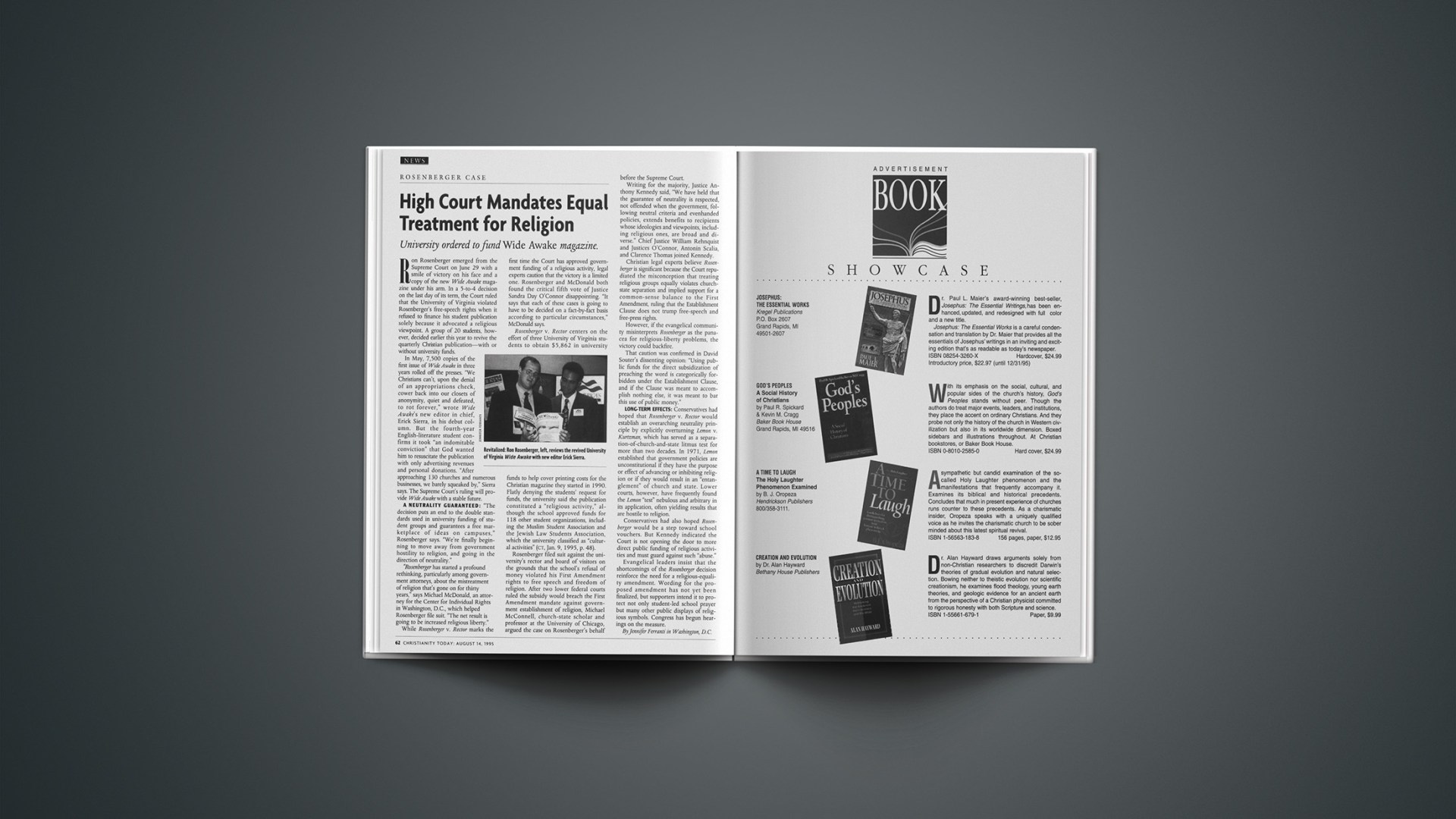University ordered to fund Wide Awake magazine.
Ron Rosenberger emerged from the Supreme Court on June 29 with a smile of victory on his face and a copy of the new Wide Awake magazine under his arm. In a 5-to-4 decision on the last day of its term, the Court ruled that the University of Virginia violated Rosenberger’s free-speech rights when it refused to finance his student publication solely because it advocated a religious viewpoint. A group of 20 students, however, decided earlier this year to revive the quarterly Christian publication-with or without university funds.
In May, 7,500 copies of the first issue of Wide Awake in three years rolled off the presses. “We Christians can’t, upon the denial of an appropriations check, cower back into our closets of anonymity, quiet and defeated, to rot forever,” wrote Wide Awake’s new editor in chief, Erick Sierra, in his debut column. But the fourth-year English-literature student confirms it took “an indomitable conviction” that God wanted him to resuscitate the publication with only advertising revenues and personal donations. “After approaching 130 churches and numerous businesses, we barely squeaked by,” Sierra says. The Supreme Court’s ruling will provide Wide Awake with a stable future.
A NEUTRALITY GUARANTEED: “The decision puts an end to the double standards used in university funding of student groups and guarantees a free marketplace of ideas on campuses,” Rosenberger says. “We’re finally beginning to move away from government hostility to religion, and going in the direction of neutrality.”
“Rosenberger has started a profound rethinking, particularly among government attorneys, about the mistreatment of religion that’s gone on for thirty years,” says Michael McDonald, an attorney for the Center for Individual Rights in Washington, D.C., which helped Rosenberger file suit. “The net result is going to be increased religious liberty.”
While Rosenberger v. Rector marks the first time the Court has approved government funding of a religious activity, legal experts caution that the victory is a limited one. Rosenberger and McDonald both found the critical fifth vote of Justice Sandra Day O’Connor disappointing. “It says that each of these cases is going to have to be decided on a fact-by-fact basis according to particular circumstances,” McDonald says.
Rosenberger v. Rector centers on the effort of three University of Virginia students to obtain $5,862 in university funds to help cover printing costs for the Christian magazine they started in 1990. Flatly denying the students’ request for funds, the university said the publication constituted a “religious activity,” although the school approved funds for 118 other student organizations, including the Muslim Student Association and the Jewish Law Students Association, which the university classified as “cultural activities” (ct, Jan. 9, 1995, p. 48).
Rosenberger filed suit against the university’s rector and board of visitors on the grounds that the school’s refusal of money violated his First Amendment rights to free speech and freedom of religion. After two lower federal courts ruled the subsidy would breach the First Amendment mandate against government establishment of religion, Michael McConnell, church-state scholar and professor at the University of Chicago, argued the case on Rosenberger’s behalf before the Supreme Court.
Writing for the majority, Justice Anthony Kennedy said, “We have held that the guarantee of neutrality is respected, not offended when the government, following neutral criteria and evenhanded policies, extends benefits to recipients whose ideologies and viewpoints, including religious ones, are broad and diverse.” Chief Justice William Rehnquist and Justices O’Connor, Antonin Scalia, and Clarence Thomas joined Kennedy.
Christian legal experts believe Rosenberger is significant because the Court repudiated the misconception that treating religious groups equally violates church-state separation and implied support for a common-sense balance to the First Amendment, ruling that the Establishment Clause does not trump free-speech and free-press rights.
However, if the evangelical community misinterprets Rosenberger as the panacea for religious-liberty problems, the victory could backfire.
That caution was confirmed in David Souter’s dissenting opinion: “Using public funds for the direct subsidization of preaching the word is categorically forbidden under the Establishment Clause, and if the Clause was meant to accomplish nothing else, it was meant to bar this use of public money.”
LONG-TERM EFFECTS: Conservatives had hoped that Rosenberger v. Rector would establish an overarching neutrality principle by explicitly overturning Lemon v. Kurtzman, which has served as a separation-of-church-and-state litmus test for more than two decades. In 1971, Lemon established that government policies are unconstitutional if they have the purpose or effect of advancing or inhibiting religion or if they would result in an “entanglement” of church and state. Lower courts, however, have frequently found the Lemon “test” nebulous and arbitrary in its application, often yielding results that are hostile to religion.
Conservatives had also hoped Rosenberger would be a step toward school vouchers. But Kennedy indicated the Court is not opening the door to more direct public funding of religious activities and must guard against such “abuse.”
Evangelical leaders insist that the shortcomings of the Rosenberger decision reinforce the need for a religious-equality amendment. Wording for the proposed amendment has not yet been finalized, but supporters intend it to protect not only student-led school prayer but many other public displays of religious symbols. Congress has begun hearings on the measure.
By Jennifer Ferranti in Washington, D.C.
Copyright © 1995 Christianity Today. Click for reprint information.
ctcurrtk5T90625814










